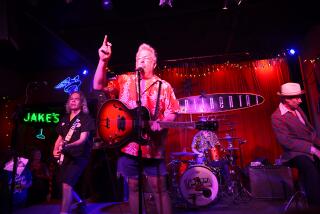Nixon Estate, U.S. Near Deal on Library
WASHINGTON — The estate of Richard Nixon and the federal government are nearing completion of an agreement under which the National Archives would assume control of the privately run Nixon Library & Birthplace in Yorba Linda, Calif., and would house his historic Watergate tape recordings there, according to a source familiar with the negotiations.
Under a proposal still under discussion, the source told The Times late Friday, the government would pay the Nixon estate $26 million in compensation for all of the former president’s White House papers and tape recordings, which the archives have held for 23 years under a law passed by Congress in 1974.
“Negotiations are still ongoing,” the source said. “Right now, there is nothing except a lot of back-and-forth. But we probably will have something three to four months down the line.”
The proposal would bring the Nixon library in line with other presidential libraries, which house the personal papers of their chief executives. The Yorba Linda facility, which opened in 1990, had no original presidential documents.
University of Indiana historian Joan Hoff, a longtime student of Nixon’s records, told the Washington Post on Friday that she does not oppose paying the Nixon estate for the records but that she strenuously opposes moving them to California. “This is unconscionable,” she said. “If this goes through, I think you’ll see a firestorm from the academic community.”
Although run by the National Archives, the presidential libraries usually function as image-polishing institutions for their presidents. According to the Post, critics contend that public access to the materials would be diminished by the arrangement even as public funds are spent to pay for them.
The talks between officials with the archives, located in Washington, and lawyers for the estate of Nixon, who died in 1994, are based on a ruling five years ago by the U.S. Court of Appeals for the District of Columbia.
In that opinion, written by Judge Harry Edwards, the court said Nixon had a constitutional right to be compensated for the government’s seizure of all his records shortly after his resignation from the presidency in August 1974. Nixon left office and headed for his then-home in San Clemente after tape recordings of his Oval Office conversations revealed that he had participated in the effort to cover up details of the 1972 break-in at Democratic Party offices at the Watergate Hotel.
Nixon’s voluminous tapes and records were seized out of concern that he would attempt to take them from the White House to California.
In enacting the 1974 Presidential Materials and Preservation Act, Congress took control of all of the material on grounds that Nixon could not be trusted to preserve the historic Watergate-related tapes--the only time a former president has been denied access to his own White House records.
Under the discussions still in progress, the Nixon estate--in return for the financial compensation--would give the federal government control of the library at Yorba Linda, which--with the exception of the White House material--holds Nixon memorabilia.
The source said that as part of the prospective accord, the Nixon Library and Birthplace Foundation would use part of the proposed payment to the estate to build a new facility to house the massive collection of more than 44 million items currently held by the archives.
The Post reported that the partly underground structure would be built to the Archives’ specifications on the nine-acre Yorba Linda property. The newspaper quoted one source as saying: “This thing could still blow up. And none of the negotiators on either side wants that to happen.”
According to the Post, one of the major stumbling blocks has been the Nixon family’s fear that the former president’s estate--valued at little more than $2 million--might be liable for inheritance taxes on the entire $26 million received in the settlement, even though much of that will end up in the nonprofit Nixon foundation.
*
The estate has requested a ruling on that issue from the Internal Revenue Service but had not received one at last report, sources close to the Nixon library and the government told the Post.
Under a separate settlement last year, the Nixon family agreed to allow the archives to begin releasing to the public many of the long-confidential Watergate tapes and other recordings that Nixon secretly made between February 1971 and July 1973 when existence of the secret recording equipment in the Oval Office was disclosed in testimony to the Senate Watergate Committee. Nixon then removed the recording equipment.
The Nixon collection is now held in the National Archives annex in College Park, Md.
Nixon’s records, told the Washington Post on Friday that she does not oppose paying the Nixon estate for the records but that she strenuously opposes moving them to California. “This is unconscionable,” she said. “If this goes through, I think you’ll see a firestorm from the academic community.”
More to Read
Sign up for Essential California
The most important California stories and recommendations in your inbox every morning.
You may occasionally receive promotional content from the Los Angeles Times.










